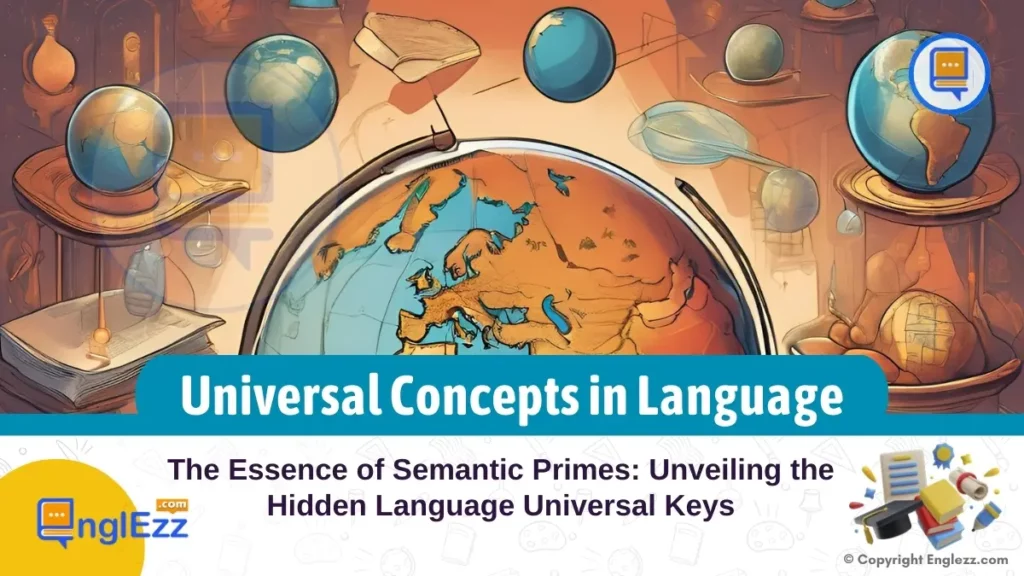Embarking on the journey through the fascinating realm of linguistics unveils a world where words are not just tools for expression, but windows into the very fabric of human cognition. At the heart of this exploration lies semantic primes – the universal concepts that form the foundation of language across diverse cultures. These linguistic building blocks hold the key to unraveling hidden language universals, offering a profound insight into how we perceive and communicate our realities.
The Essence of Semantic Primes: Universal Concepts in Language
For linguistics scholars, language enthusiasts, and psychology researchers alike, grasping the essence of semantic primes transcends mere academic curiosity; it is an odyssey towards understanding the intricate nuances that shape human thought and expression. By delving into these universal keys embedded within languages worldwide, we gain more than linguistic insights – we unearth shared cognitive structures that bind us together in a tapestry of collective understanding.

Join us as we embark on a voyage to uncover the enigmatic world of semantic primes, where every word holds within it a treasure trove of meaning waiting to be decoded.
Semantic Primes: The Foundational Concepts
In the realm of linguistics, semantic primes are considered the bedrock on which languages are built. These elemental concepts represent universal notions that are essential for expressing a wide array of meanings across diverse languages. Often described as irreducible and innately understood, semantic primes serve as the foundation that enables communication between individuals from distinct cultures.
- For instance, consider the concept of ‘I,’ representing the speaker’s self or ‘you,’ denoting the person being addressed. These basic pronouns are indispensable in forming sentences and are vital components in language construction worldwide.
The significance of semantic primes lies in their ability to capture fundamental human experiences and emotions through simple yet powerful symbols. Words like ‘do,’ ‘think,’ and ‘feel’ stand as pillars in linguistic frameworks, reflecting common threads that bind humanity irrespective of cultural differences. By studying these foundational elements, linguists gain insights into how languages shape our understanding of the world around us.
- For example, the concept of ‘good’ or ‘bad’ transcends linguistic barriers and is universally recognized, showcasing how semantic primes express moral values inherent to human nature.
Exploring semantic primes unveils a web of interconnected meanings that underpin our communication systems. Concepts like ‘give’ or ‘take’ hold significant weight across languages, illustrating actions intrinsic to human interactions. In essence, these core elements act as bridges uniting disparate languages by elucidating shared cognitive patterns engrained within our linguistic expressions. Through analyzing semantic primes, researchers delve deeper into the fabric of language structure and unravel the intricate tapestry of universal concepts that resonate with people across cultures.
Uncovering Linguistic Universals Through Semantic Primes
Delving into the realm of semantic primes not only provides linguists with a profound understanding of universal language concepts but also unveils striking commonalities that bridge diverse languages. By analyzing these foundational elements, researchers can uncover the shared cognitive structures that underpin human communication worldwide.
For instance, the core concept of ‘time’ as a semantic prime transcends linguistic boundaries, manifesting in various forms across languages – from tense markers in English to distinct words for past, present, and future in other cultures. This exploration showcases how fundamental ideas are intricately woven into the fabric of language, offering insights into our collective cognitive frameworks.
Keep exploring the world of semantic primes and universal concepts in language to deepen your understanding of human communication. Stay curious and open-minded towards discovering new linguistic universals that can bridge cultural gaps and enhance cross-cultural interactions. For instance, look into how words like “you,” “I,” or “we” showcase interpersonal relationships across languages and cultures, highlighting core social dynamics shared by diverse communities.
Case studies serve as compelling evidence of how identifying universal concepts through semantic primes enhances cross-cultural communication and comprehension. For instance, the research on color terms reveals similarities in basic color categorizations across languages. Understanding these shared patterns not only facilitates smoother interactions between speakers of different languages but also sheds light on the universality of human perception and cognition. Such studies highlight the transformative power of recognizing linguistic universals through semantic primes, fostering mutual understanding and appreciation among diverse linguistic communities.
The implications of acknowledging linguistic universals extend far beyond the realm of traditional linguistics. Fields such as cognitive psychology and anthropology benefit greatly from this interdisciplinary approach, tapping into the rich insights offered by studying universal language keys. By examining how semantic primes shape thought processes and cultural perspectives, psychologists gain valuable insights into the intricate relationship between language, cognition, and behavior.
Similarly, anthropologists can unravel deep-seated cultural norms and belief systems by dissecting the universal concepts embedded within language structures. Embracing these hidden language universal keys unlocks a treasure trove of knowledge that transcends disciplinary boundaries, enriching our understanding of human nature and societal dynamics.
Psychological Insights Derived from Universal Language Keys
The exploration of shared semantic primes across diverse cultures unveils profound psychological insights into the human experience. Understanding universal language keys goes beyond deciphering words; it delves deep into the way our minds process information and construct perceptions of reality. By analyzing how specific semantic primes are universally recognized and utilized, researchers can gain valuable insights into the cognitive frameworks that shape human thought processes.
- For instance, concepts like ‘I,’ ‘you,’ ‘we,’ or ‘do’ could reveal not only linguistic patterns but also fundamental aspects of social interaction and individual agency embedded in our psychological makeup.
Furthermore, the study of universal language keys offers a unique lens through which to analyze emotional responses and mental frameworks in individuals from different cultural backgrounds. Research findings have shown that certain semantic primes evoke common emotional reactions universally, transcending linguistic and cultural boundaries.
For example, the concept of ‘good’ or ‘bad’ may trigger similar positive or negative associations regardless of one’s native language, indicating a shared cognitive basis for evaluating values and experiences. Such insights highlight the intricate connection between language and psychology, showcasing how understanding universal language primitives can deepen our comprehension of human emotions and behaviors.
Moreover, by examining how specific semantic primes are employed across various languages to convey nuanced meanings, researchers can uncover underlying similarities in the ways different societies interpret reality. This comparative approach not only enhances cross-cultural communication but also provides valuable data for studies on human cognition and perception.
- For instance, analyzing how concepts like ‘give’ or ‘take’ are expressed across languages reveals fundamental principles governing social interactions such as reciprocity and exchange, shedding light on universal cognitive processes that shape human behavior globally.
The psychological implications derived from decoding universal language keys serve as a bridge connecting linguistic diversity with shared cognitive foundations, offering a holistic understanding of humanity’s rich tapestry of thoughts and expressions.
Challenges in Deciphering Hidden Language Universal Keys
Delving into the realm of hidden language universal keys through semantic primes poses a myriad of challenges for researchers aiming to unravel the intricate tapestry of human communication. One significant obstacle encountered is the task of differentiating between genuine universality and cultural intricacies deeply entrenched within languages. For instance, while concepts like ‘I’, ‘you’, ‘we’, and ‘do’ may seem universally basic, nuances in their usage across languages can complicate the identification of true semantic primes that transcend cultural boundaries. Treading this fine line demands meticulous attention to detail and a deep understanding of both linguistic structures and cultural contexts.
Engage in interdisciplinary collaborations with experts from various fields like linguistics, psychology, and anthropology to gain diverse perspectives on hidden language universal keys. By combining insights from different disciplines, you can uncover richer layers of meaning embedded within linguistic expressions. For example, working with psychologists can reveal how certain semantic primes evoke specific emotional responses universally, shedding light on interconnectedness between language and human psychology.
Moreover, scholars face the complexity of navigating through the vast array of linguistic expressions present in diverse languages worldwide to extract authentic universal concepts. The challenge lies not only in recognizing shared linguistic elements but also in discerning subtle variations that might hinder a comprehensive understanding of semantic primes. An example would be distinguishing between core emotional states such as happiness, sadness, anger, or fear from culturally specific manifestations within language constructs, which requires a nuanced approach to unveil genuine universal themes.
To address these challenges effectively, researchers often employ strategic methodologies grounded in cross-disciplinary insights to decipher hidden language universal keys. By integrating tools from cognitive psychology, anthropology, and computational linguistics, scholars can enhance their ability to disentangle the complex web of linguistic diversity and uncover underlying cognitive structures common to humanity. These interdisciplinary approaches facilitate a more holistic exploration of semantic primes, enabling a deeper appreciation of the interconnectedness between language, culture, and cognition on a global scale.
Interdisciplinary Applications of Universal Keys in Language Studies
The decoding of hidden language universal keys has sparked a wave of interdisciplinary collaborations among linguists, psychologists, and anthropologists. By delving into the core concepts represented by semantic primes, researchers are unraveling profound insights that transcend traditional disciplinary boundaries. For instance, linguists working alongside psychologists have uncovered fascinating connections between specific semantic primes and human cognition. By exploring how universally recognized concepts influence thought processes, these collaborations have shed light on the intricate relationships between language, culture, and mental frameworks.

One compelling example of successful interdisciplinary cooperation is the study focusing on societal norms and communication dynamics across cultures. Linguists analyzing how certain semantic primes manifest differently in various languages partnered with anthropologists to explore the implications on social interactions. Through this joint effort, researchers not only deciphered common patterns in linguistic expressions but also unearthed deeper truths about human behavior influenced by shared universal concepts. This synergy between linguistic analysis and anthropological observations exemplifies how uncovering hidden language universal keys can enhance our understanding of complex societal structures.
Moreover, collaborative projects involving psychologists have emphasized the impact of semantic primes on emotional responses and perception. By examining the psychological implications of universal language primitives, researchers have made significant strides in linking specific words or phrases to distinct emotional triggers across different cultural contexts.
This innovative approach has enriched studies on human behavior by identifying fundamental cognitive processes that shape emotional experiences universally. Therefore, through interdisciplinary applications of universal keys in language studies, researchers continue to forge new paths towards a holistic comprehension of human communication and cognition.
Embracing the Unity in Diversity
The journey through the world of semantic primes and hidden language universal keys unveils a remarkable tapestry that connects humanity across linguistic boundaries. By recognizing and delving into these universal concepts, linguistics scholars, language enthusiasts, and psychology researchers embark on a quest not just for understanding but for unity amidst diversity. The shared foundational elements present in different languages serve as bridges that span cultures and civilizations, emphasizing our common human experience.
As we navigate the intricate web of semantic primes, it becomes evident that embracing the unity found within linguistic diversity is crucial for building stronger connections and fostering mutual understanding. Just as colors blend to create a vibrant painting, the universal concepts embedded within language act as threads weaving together the fabric of global communication. By continuing to explore and appreciate these shared linguistic foundations, we pave the way for richer interactions that transcend mere words.
Apply your knowledge of semantic primes in real-world contexts to appreciate the power of universal concepts in fostering effective communication. Experiment with using basic semantic primes to convey complex ideas succinctly and clearly, demonstrating the versatility of foundational language elements across different cultures. For instance, observe how concepts like “good” or “bad” transcend linguistic boundaries to express moral values universally, emphasizing shared beliefs that underpin human societies.
Therefore, it is imperative to heed the call-to-action for continued exploration into the hidden language universal keys that hold immense potential for unlocking deeper layers of human expression. Through collaborative efforts across disciplines and a dedication to unraveling the mysteries of linguistic universals, we not only enhance our comprehension of diverse languages but also celebrate the beauty of unity amidst cultural variety. In this journey towards enlightenment, may we embrace diversity as a cornerstone of harmony and strive to unravel more layers of our shared linguistic heritage.
Embracing Unity Through Universal Language Concepts
The exploration of semantic primes has revealed the interconnectedness of languages worldwide, showcasing common threads that bind humanity through shared linguistic foundations. By delving into these universal concepts, linguistics scholars, language enthusiasts, and psychology researchers can gain profound insights into the fundamental aspects of human communication, cognition, and emotion. The significance of embracing this unity amidst linguistic diversity cannot be overstated, as it paves the way for enhanced cross-cultural understanding and collaboration.
As we continue to decipher hidden language universal keys through semantic primes, it is essential to appreciate the beauty of linguistic diversity while recognizing the underlying universality that unites us all. By uncovering these universal concepts embedded within languages, we not only enhance our understanding of human expression but also cultivate a deeper sense of empathy and connection across borders and cultures. Let us embrace the rich tapestry of languages as a reflection of our shared humanity, celebrating both our differences and our commonalities.
FAQs: Frequently Asked Questions About Semantic Primes
1. What are semantic primes?
Semantic primes are basic conceptual building blocks that are thought to exist universally in all languages. They represent fundamental meanings that cannot be broken down further without losing their core essence.
2. How do semantic primes help in understanding language universals?
By identifying and analyzing semantic primes across diverse languages, researchers can uncover common patterns and cognitive structures that underlie human communication. This helps reveal similarities in how different cultures express basic concepts.
3. Can semantic primes be cultural-specific?
While certain nuances may vary across cultures in how semantic primes are expressed or interpreted, the core concepts themselves are believed to be universal among all human beings.
4. What role do semantic primes play in psychology research?
Understanding shared semantic primes can provide valuable insights into human cognition, emotion, and perception across cultures. It allows psychologists to study how fundamental concepts influence behavior and mental processes universally.
5. Are there practical applications for studying semantic primes beyond linguistics?
Yes, recognizing universal language keys through semantic primes can have interdisciplinary applications in fields like anthropology and cognitive psychology. These insights help enhance cross-disciplinary research collaborations aimed at understanding human behavior holistically.









Universal Concepts in Language are at the heart of understanding. Learn about semantic primes and their impact on clarity and connection in communication!